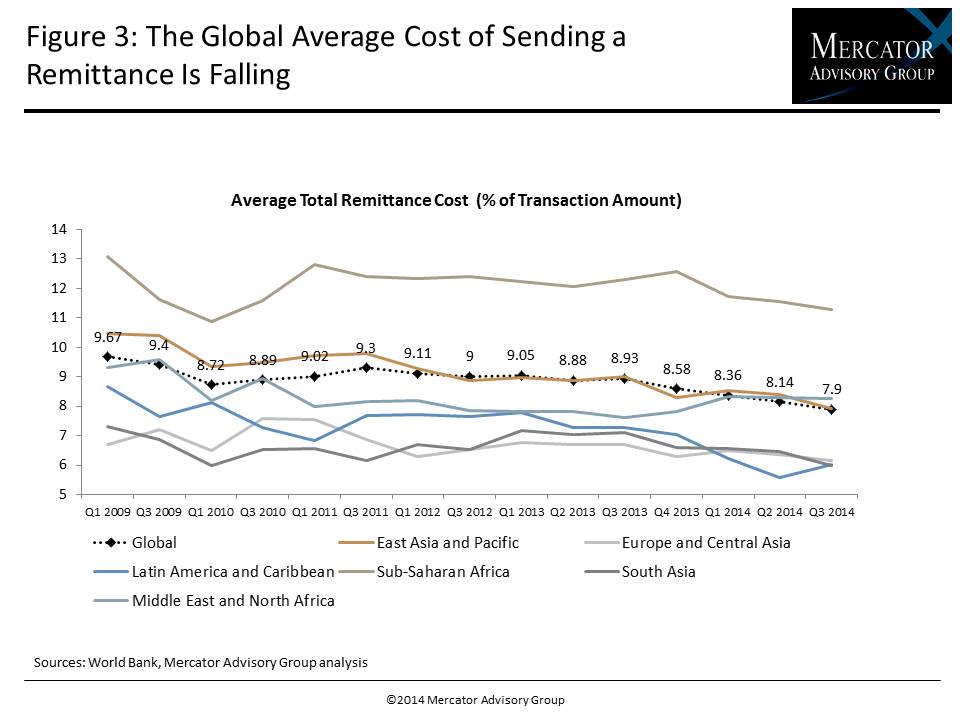Overview
Cross-border remittances are expensive, especially for those who can least afford it to be: the unbanked and the underbanked. For Bitcoin enthusiasts, this represents one of the digital currency’s most important use cases. By bypassing the expensive fees and onerous regulatory requirements of international correspondent banking channels, the backbone of global money transmission today, Bitcoin-backed remittance evangelists claim they will both do good and make a profit.
The other model that seeks to displace traditional consumer remittance service providers uses peer-to-peer algorithms to match individuals with reciprocal currency needs across borders. TransferWise, one of the pioneers of this model, promises to charge a fraction of what banks do today to move money between countries.
Mercator Advisory Group’s research report, A SWIFT Disruption? Bitcoin and Peer-to-Peer Models Challenge the Remittance Business, analyzes the value proposition offered by these new models by focusing on two specific remittance corridors, U.S.-Philippines and U.S.-India. It analyzes data on total costs for different transaction sizes and compares these to incumbent competitors. What’s common to both these disruptive models and what separates them from the incumbents in the consumer remittance space is that neither relies on the international correspondent banking channels, which are underpinned by SWIFT—a secure financial messaging system—in order to effect the movement of monetary value across borders.
“For established consumer remittance behemoths like Western Union and MoneyGram and for banks that generate substantial revenues from their wire transfer business aimed at corporate and affluent consumers, these challengers may be easy to dismiss either because their business model is unproven (as in the case of Rebit) or their market share is still fairly limited (as in the case of TransferWise). The history of disruptive innovation in the last half-century, however, suggests that dismissing potentially game-changing technologies as unsuited to present needs is a sure way to be rendered obsolete in the future,” comments Nikhil Joseph Analyst, Emerging Technologies Advisory Service, at Mercator Advisory Group and author of the report.
This report contains 24 pages and 12 exhibits.
Companies mentioned in this report include Currency Cloud, CurrencyFair, Rebit, Remitly, Ripple, TransferWise, WorldRemit, BitPesa, Western Union, and Xoom.
Members of Mercator Advisory Group’s Emerging Technologies Advisory Service have access to this report as well as the upcoming research for the year ahead, presentations, analyst access, and other membership benefits.
One of the exhibits included in this report:

Highlights of this report include:
- Identification of the key trends in cross-border consumer remittances including analysis of global transactions costs across different corridors
- Breakdown of how the international correspondent banking system works and the role SWIFT plays
- Explanation of how Bitcoin’s blockchain technology works and why it can be a disruptive force in enabling cross-border payments
- Review of the value proposition offered by Bitcoin-backed remittance player Rebit in the U.S.-Philippines corridor
- Explanation of how the peer-to-peer model works in facilitating cross-border remittances and analysis of TransferWise’s value proposition in the U.S.-India corridor
- Review of innovative startups with the potential to disrupt the global consumer remittance market
Learn More About This Report & Javelin
Related content
‘Disappearing’ Accounts and the Future of Payments
The legacy view of accounts—rigid holdings and lines of credit in financial silos—is yielding to the reality of open banking and interoperability, by which the walls around those a...
Generative AI Isn’t Happening Like We’ve Been Told
Although the AI future isn’t coming as quickly as we were told, it will arrive. Bringing that future to life will require new plumbing (read: technological standards and infrastruc...
Fintech Investing: 3 Trends to Watch in 2025
Venture capital investment in fintech is being gobbled up by AI startups, but the implications for players in the payments space is much more expansive. In the year ahead, look for...
Make informed decisions in a digital financial world